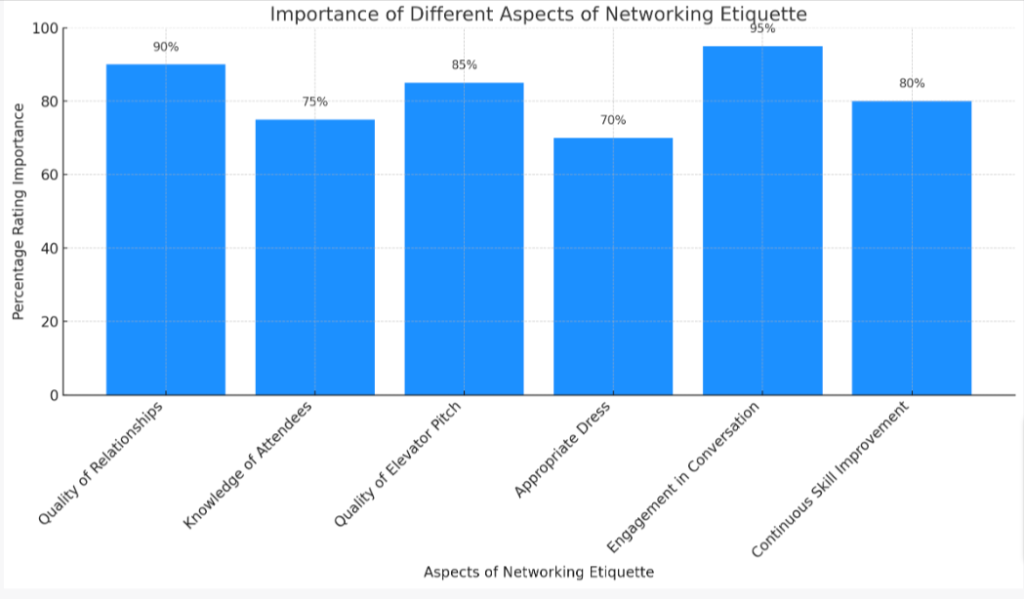The Art of First Impressions: Networking Etiquette Essentials
Do you often find yourself feeling awkward or unsure how to act during networking events? You’re not alone – a study from Harvard Business Review reveals that over 85% of professionals feel anxious about attending such gatherings.
This blog post will guide you through the key etiquette points for building strong connections and making an unforgettable first impression. Ready to command every room with confidence? Let’s dive in!
Key Takeaways
- Building meaningful relationships involves engaging on a personal level and showing genuine interest in others’ work and ideas.
- Expanding your network at networking events can lead to valuable connections and opportunities.
- Researching the event and audience, having business cards ready, and preparing an elevator pitch are essential for making a good first impression.
- Making eye contact, smiling, dressing appropriately, being authentic, using positive body language, listening actively, and showing interest are key to leaving a lasting positive impression.
Why Networking is Important
Networking is important because it allows for the building and expanding of meaningful relationships, as well as the opportunity to grow and consolidate your professional network.
Building meaningful relationships
Making meaningful connections involves more than just exchanging business cards at networking events. It’s about putting in the effort to engage people on a personal level, demonstrating genuine interest in their work and ideas.
Positive interactions can lead to stronger professional relationships, so it’s important to show respect and remain authentic. You don’t just want contacts; you aim for allies, mentors, or even friends within your network.
These bonds often prove beneficial for both parties involved, opening doors to opportunities otherwise not possible without this connection.
Expanding and consolidating your network
Networking events provide a golden opportunity for expanding your network. With each handshake and meaningful conversation, you add another contact to your professional web. Engage with new faces at every event and strive to build relationships that are not only beneficial but also enjoyable.
Consolidating your network involves maintaining the quality of these relationships. Quality connections can lead to job opportunities, partnerships, or simply an exchange of ideas that could shape future projects.
Regularly engage with contacts through social media, email or catch-up meetings to keep these bonds strong and mutually beneficial.
Preparing for a Networking Event
Research the event and audience to gather information that will help you make meaningful connections.
Research the event and audience
Thoroughly investigating the event and its attendees is a crucial step. You can gain insight from the event flyer, website or social media posts to understand its purpose and format.
Knowing who will be there aids in identifying potential connections. Use LinkedIn or other professional platforms to learn about their roles, companies, and interests. This background knowledge equips you with conversation starters that show your interest in others’ work, making you come across as genuine and thoughtful at networking events.
Have business cards at the ready
When attending networking events, it is essential to have your business cards readily available. These small but powerful tools serve as a tangible reminder of who you are and what you do.
By handing out your business card, you make it easier for others to remember you and follow up after the event. It shows that you are prepared and professional, making a strong first impression.
So before heading out to any networking event, ensure that you have a stack of your business cards at the ready to maximize your opportunities for building valuable connections.
Prepare an elevator pitch
Crafting an elevator pitch is an essential aspect of preparing for a networking event. An elevator pitch is a brief and compelling introduction about yourself that should leave a lasting impression on others.
Keep it short, concise, and engaging, focusing on highlighting your strengths, skills, and goals. Use simple language to clearly convey your message without overwhelming the listener with unnecessary details.
Practice delivering your pitch with confidence to ensure smooth delivery during networking encounters. Remember that an effective elevator pitch can help you stand out from the crowd and make a strong first impression.
In summary: Crafting a powerful elevator pitch is crucial when preparing for a networking event. Keep it concise, engaging, and confident while emphasizing your strengths and goals.
Present yourself professionally
Dress appropriately and maintain a professional appearance when attending networking events. Your attire should be suitable for the occasion and reflect your personal brand. This will help you make a good first impression and show that you take the event seriously.
Additionally, pay attention to your body language by maintaining an open posture, making eye contact, and giving a firm handshake. These small gestures can convey confidence and professionalism, leading to more meaningful connections with others at the event.
Be aware of body language
Your body language can speak volumes before you even say a word. When it comes to networking events, being aware of your body language is crucial for making a good first impression.
Make sure to maintain eye contact with the person you are speaking to, as this shows attentiveness and interest. A genuine smile can also go a long way in creating a positive atmosphere and building rapport.
Additionally, dressing appropriately for the occasion demonstrates professionalism and respect for the event. Pay attention to your posture and use open gestures, as this conveys confidence and approachability.
Lastly, remember that effective communication is not just about what you say but how you say it through your body language.
By being mindful of your body language at networking events, you can project confidence and make others feel comfortable around you. This sets the stage for meaningful interactions that could lead to valuable connections in both personal and professional spheres.
Making a Good First Impression
To make a good first impression at networking events, it is essential to make eye contact, smile, dress appropriately, and be authentic. Additionally, using positive body language and actively listening and showing interest in others will help you leave a lasting impression.
Make eye contact
Making eye contact is crucial when it comes to making a good first impression at networking events. When you make eye contact with someone, it shows that you are engaged and interested in what they have to say.
It also conveys confidence and establishes a connection between you and the other person. By maintaining eye contact throughout your conversation, you demonstrate respect and attentiveness, which can leave a positive lasting impression.
So, remember to keep your gaze focused on the person you’re speaking with to make them feel valued and important.
Smile
Smiling is a powerful tool for making a good first impression at networking events. It instantly makes you appear approachable and friendly, helping to establish a positive connection with others.
When you smile, it creates an inviting and welcoming atmosphere, encouraging others to engage in conversation with you. A genuine smile also shows confidence and enthusiasm, demonstrating that you are open to meeting new people and building meaningful relationships.
So, don’t forget to put on your best smile when attending networking events – it can make all the difference in creating a lasting impression.
Dress appropriately
Dressing appropriately is crucial when attending networking events. Your attire reflects your professionalism and can leave a lasting impression on others. Opt for business or business casual attire that is neat, clean, and well-fitted.
Avoid wearing anything too flashy or revealing, as it may distract from your conversation and credibility. Dressing appropriately shows that you take the event seriously and are ready to engage in meaningful conversations with potential connections.
Be authentic
Authenticity is crucial when it comes to making a good first impression at networking events. By being true to yourself and genuine in your interactions, you will be able to build meaningful connections with others.
Avoid putting on a facade or trying to impress people by pretending to be someone you’re not. Instead, focus on showcasing your unique skills, experiences, and personality traits that set you apart from others.
When you are authentic, people are more likely to trust and remember you, leading to stronger relationships in the long run. So embrace who you are and let your authenticity shine through during networking events.
Use positive body language
Positive body language can have a significant impact when making a good first impression at networking events. Maintaining eye contact demonstrates confidence and engagement, while also showing respect to the person you’re speaking with.
Additionally, remember to smile warmly as it helps create a welcoming and friendly atmosphere. Dressing appropriately for the event is another crucial aspect of positive body language as it shows professionalism and respect for the occasion.
Being authentic in your interactions is equally important since genuine gestures and expressions help build trust and rapport with others. Practicing positive body language will not only leave a lasting impression but also contribute to effective communication and successful networking experiences overall.
Listen and show interest
When engaging in networking events, it is crucial to actively listen and show genuine interest in what others have to say. Listening attentively demonstrates respect and appreciation for the other person’s thoughts and ideas.
Maintain eye contact, nodding occasionally to indicate understanding and engagement. Be present in the conversation, avoiding distractions such as checking your phone or looking around the room.
Engaging with others in a meaningful way not only creates a positive impression but also opens up opportunities for building strong professional relationships.

Following Up and Building Relationships
Consistently follow up with new connections, expand your network while maintaining quality relationships, and practice and continue to improve your networking skills.
Consistently follow up with new connections
Consistently following up with new connections is a crucial step in networking. After making a good first impression, it’s important to maintain the momentum by reaching out and staying in touch.
This can be done through email, phone calls, or even meeting up for coffee. By regularly staying connected, you show your genuine interest in building a relationship and increase the likelihood of future collaborations or opportunities.
Keeping this consistent follow-up habit will not only strengthen your network but also demonstrate your commitment to professional relationships.
Expand your network while maintaining quality relationships
Expand your network while maintaining quality relationships by consistently following up with new connections. Networking is not just about making initial contact; it’s about nurturing and growing those connections over time.
Reach out to your new contacts regularly, whether through email, social media, or in-person meetings. By staying in touch and showing genuine interest in their work or projects, you can build stronger relationships that will lead to more opportunities down the line.
Remember to prioritize quality over quantity when expanding your network – focus on building meaningful connections rather than simply collecting business cards.
Practice and continue to improve your networking skills.
Keep honing your networking skills by practicing and seeking opportunities to improve. Attend networking events regularly, join professional organizations, and actively engage in conversations with new people.
Focus on listening attentively, maintaining eye contact, and displaying positive body language. Keep refining your elevator pitch and finding ways to authentically connect with others.
By consistently practicing and striving for improvement, you’ll become more confident in making a lasting impression at networking events. Remember that building meaningful relationships takes time and effort, so stay committed to expanding your network while nurturing existing connections.
Conclusion
Making a good first impression at networking events is crucial for building meaningful relationships and expanding your professional network. By researching the event, preparing an elevator pitch, presenting yourself professionally, and using positive body language, you can confidently make connections that will help advance your career.
Remember to follow up consistently with new connections and continuously improve your networking skills to maintain quality relationships. Put these tips into practice to leave a lasting positive impression on everyone you meet in the networking world.

